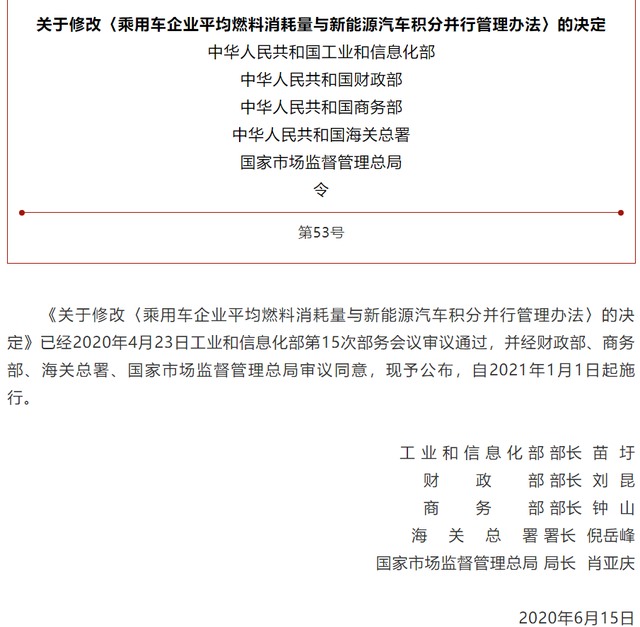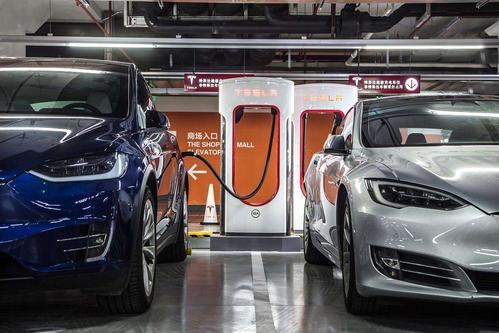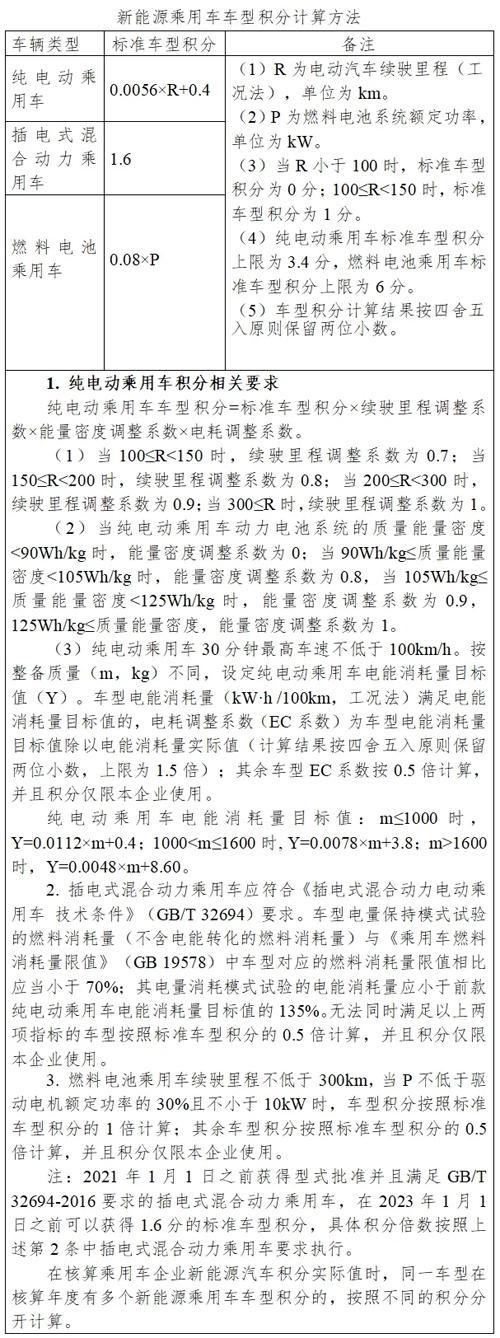In addition to Weibo, there is also WeChat
Please pay attention

WeChat public account
AutoBeta


2024-11-17 Update From: AutoBeta autobeta NAV: AutoBeta > News >
Share
AutoBeta(AutoBeta.net)06/22 Report--
The development of new energy vehicles is bound to be a general trend for the domestic market, which is affected by the performance of the new energy market, the unfavorable factors of novel coronavirus and the change of market demand. A few days ago, five departments, including the Ministry of Industry and Information Technology and the Ministry of Finance, issued a new "double points" policy for the automobile industry.

According to the decision issued by the Ministry of Industry and Information Technology on revising the parallel Management measures for the average fuel consumption of passenger car Enterprises and the points of New Energy vehicles. It is clear that the proportion requirements for new energy vehicles from 2021 to 2023 are 14%, 16% and 18%, respectively. This new policy will come into effect on January 1, 2021.
According to this ratio, it is estimated that by 2025, the average fuel consumption of new passenger cars in China will reach 4.0 litres per 100 kilometers, while the current average fuel consumption in the industry will reach 5.5 litres per 100 kilometers, down more than 10 percent from 2016, according to the Ministry of Industry and Information Technology. Although China's sales of new energy passenger vehicles reached 1.06 million in 2019, ranking first in the world for five consecutive years, the proportion of production and sales of new energy vehicles is still small, and it is expected to reach 20% of the total number of vehicles in 2025.
Although the double points policy has been adjusted, the supply of positive and negative points market in 2021-2023 is expected to be slightly larger than demand, and the integral price objectively reflects the market value.

The main contents of the revision of the "integral method" are, first, to increase the measures to guide the energy saving of traditional passenger vehicles; second, to improve the integration flexibility measures of new energy vehicles; third, to enrich the identification conditions of related enterprises; fourth, to include passenger cars burning alcohol and ether fuel in the scope of accounting, and to give accounting concessions to models with the advantages of energy saving and emission reduction.
The main reason for the revision of the "points method" is that the supply of points exceeds demand, the price of points is on the low side, and the guidance for the development of new energy vehicle industry is not enough. In 2018 and previous years, there are no requirements for the proportional assessment of new energy vehicles, and all new energy vehicles produced by enterprises produce positive points, resulting in more positive points; and with the rapid technological development and progress of the industry, vehicle mileage is also increasing, vehicle score is also increased accordingly; and some enterprises consider technology, commerce and other cooperation factors have the phenomenon of low-price transactions. Therefore, these situations are fully taken into account in the revision of the "integral method".
The following is the full text of the decision:
Decision on revising the parallel Management measures for the average fuel consumption of passenger vehicle Enterprises and the points of New Energy vehicles
In order to meet the needs of the development of China's energy conservation and new energy vehicle industry, the Ministry of Industry and Information Technology and other relevant departments have decided to amend the "measures for parallel Management of average fuel consumption of passenger vehicle Enterprises and points of New Energy vehicles" as follows:
1. The third paragraph of Article 4 shall be revised as follows: "the traditional energy passenger vehicle referred to in these measures refers to the passenger vehicle other than the new energy passenger vehicle, which can burn gasoline, diesel, gaseous fuel or alcohol ether fuel (including non-plug-in hybrid passenger vehicles)."
One paragraph is added as the fourth paragraph of Article 4: "low fuel consumption passenger vehicles referred to in these measures" refers to traditional energy passenger vehicles whose comprehensive fuel consumption does not exceed the product of the target value of vehicle fuel consumption corresponding to the "Evaluation methods and indicators of fuel consumption of passenger vehicles" and the requirements of the enterprise average fuel consumption in the accounting year (the calculation results retain two decimal places according to the rounding principle). "
2. The first paragraph of Article 12 shall be revised as follows: "for domestic passenger car manufacturing enterprises with an accounting annual production capacity of less than 2000 vehicles and independent production, R & D and operation, imported passenger car supply enterprises with an import volume of less than 2000 vehicles authorized by overseas passenger car manufacturing enterprises shall relax the requirements for reaching the standards of their average fuel consumption points:
(1) from 2016 to 2020, if the average fuel consumption of an enterprise is more than 6% lower than that of the previous year, the standard value shall be relaxed by 60% on the basis of the enterprise average fuel consumption requirements stipulated in the Evaluation methods and indicators of fuel consumption for passenger vehicles; if the decrease is less than 3%, the standard value shall be relaxed by 30%.
(2) from 2021 to 2023, if the average fuel consumption of an enterprise has decreased by more than 4% compared with the previous year, the standard value shall be relaxed by 60% on the basis of the enterprise average fuel consumption requirements stipulated in the Evaluation methods and indicators of fuel consumption for passenger vehicles; if the decrease is less than 2%, the standard value shall be relaxed by 30%.
(3) the accounting requirements for 2024 and subsequent years shall be promulgated separately by the Ministry of Industry and Information Technology. "
Article 16 one paragraph is added as the second paragraph: "the production or import of passenger vehicles with low fuel consumption in traditional energy vehicles shall be calculated in accordance with the following provisions:
(1) in 2021, 2022 and 2023, the production or import of passenger cars with low fuel consumption will be calculated on the basis of 0.5 times, 0.3 times and 0.2 times of their quantity, respectively.
(2) the calculation multiples of the production or import of passenger vehicles with low fuel consumption in 2024 and subsequent years shall be separately promulgated by the Ministry of Industry and Information Technology. "
Paragraph 2 of Article 17 is revised as follows: "the integral proportion requirements for new energy vehicles in 2019, 2020, 2021, 2022 and 2023 are 10%, 12%, 14%, 16% and 18%, respectively. The integral ratio requirements for new energy vehicles in 2024 and later years will be promulgated separately by the Ministry of Industry and Information Technology. "
5. the second paragraph of Article 22 shall be revised as follows: "the positive points of new energy vehicles of passenger car enterprises may be freely traded in accordance with these measures and carried forward in accordance with the following provisions, and the period of validity of the carry-over shall not exceed three years:
(1) the positive points of new energy vehicles in 2019 can be carried forward in equal amount for one year.
(2) for the positive points of new energy vehicles in 2020, the carry-over ratio is 50% for each carryover.
(3) if the ratio of the average fuel consumption of passenger vehicle enterprises in 2021 and later years (only traditional energy passenger vehicles) to the up-to-standard value is not higher than 123%, the positive integral carry-over of new energy vehicles generated in the current year shall be allowed, and the carry-over ratio shall be 50% for each carryover. The positive points of new energy vehicles generated by passenger car companies that only produce or import new energy vehicles are carried forward according to the proportion of 50%. "
One paragraph is added as the fourth paragraph of Article 22: "the Ministry of Industry and Information Technology may decide to extend the compensation period and adjust the positive integral carry-over ratio of new energy vehicles in 2020 according to the development of the automobile industry."
Article 23 shall be revised as follows: "passenger car enterprises with one of the following relationships shall belong to the affiliated enterprises specified in paragraph 1 of Article 22 of these measures:
(1) domestic passenger car manufacturing enterprises and other domestic passenger car manufacturing enterprises with a total direct or indirect shareholding of more than 25%
(2) domestic passenger car manufacturing enterprises with a total direct or indirect shareholding of more than 25% by both third parties
(3) an imported passenger car supply enterprise authorized by an overseas passenger car manufacturing enterprise, and a domestic passenger car manufacturing enterprise with a total direct or indirect shareholding of more than 25%, and a domestic passenger car manufacturing enterprise that directly or indirectly holds more than 25% of the total shareholding of the overseas passenger car manufacturing enterprise. "
Article 27 shall be revised as follows: "the negative points of new energy vehicles of passenger car enterprises shall be offset to zero through the positive points of new energy vehicles."
8. Add one paragraph as the second paragraph of Article 28: "the Ministry of Industry and Information Technology may, according to the development of the automobile industry, decide that passenger car enterprises use the positive points of new energy vehicles generated in 2021 to offset the negative points of new energy vehicles generated in 2020."
9. the "General Administration of quality Supervision, Inspection and Quarantine" in articles 3, 21, 31 and 32 shall be amended to "General Administration of Market Supervision".
Paragraph 5 of Article 32 shall be revised as follows: "the General Administration of Market Supervision shall be responsible for verifying the parameters of imported new energy passenger vehicles and fuel consumption of imported passenger vehicles that have obtained compulsory product certification."
11. The integral calculation method of new energy passenger vehicles in Annex 2 is revised as follows:

In addition, individual words should be modified accordingly.
This decision shall enter into force as of January 1, 2021. The measures for parallel Management of average fuel consumption of passenger car Enterprises and New Energy vehicle points (decree No. 44 of the General Administration of quality Inspection and Quarantine of the Ministry of Industry and Information Technology, Ministry of Finance, Ministry of Commerce, General Administration of Customs, General Administration of Customs) shall be revised accordingly and re-promulgated in accordance with this decision.
Welcome to subscribe to the WeChat public account "Automotive Industry Focus" to get the first-hand insider information on the automotive industry and talk about things in the automotive circle. Welcome to break the news! WeChat ID autoWechat
Views: 0
*The comments in the above article only represent the author's personal views and do not represent the views and positions of this website. If you have more insights, please feel free to contribute and share.











© 2024 AutoBeta.Net Tiger Media Company. All rights reserved.